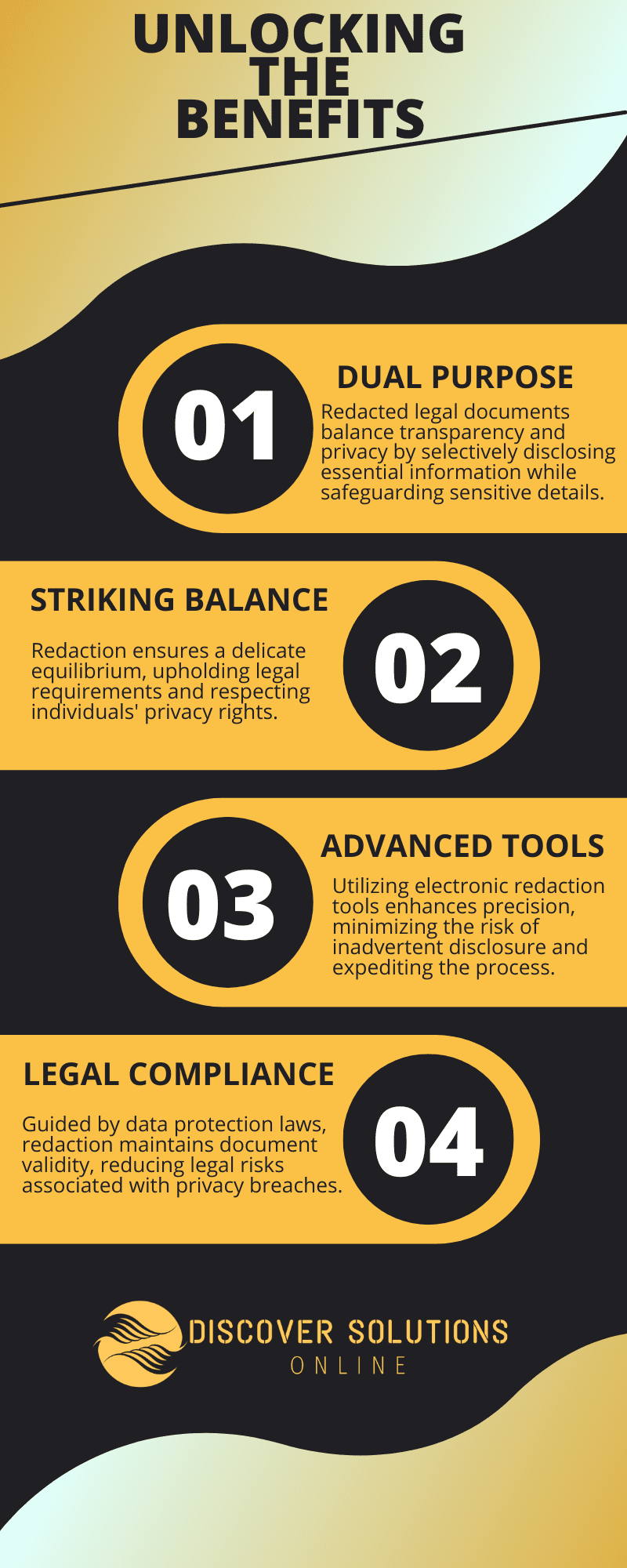Striking a balance between transparency and privacy is crucial when redacting sensitive information in legal documents. While transparency fosters public trust and accountability, safeguarding individual privacy is paramount. Overly broad redactions hinder public understanding, while inadequate ones expose individuals to unwarranted scrutiny. Determining what information to redact is complex, requiring careful consideration of the information’s sensitivity, public interest, and alternative sources. Ethical guidelines emphasize protecting privacy, ensuring transparency, and avoiding selective redactions. Technology has both facilitated and complicated redactions, with electronic tools aiding the identification and removal of sensitive information while increasing the risk of inadvertent disclosure through metadata. The evolving landscape of redactions necessitates ongoing debate and refinement to balance transparency and privacy in legal documents.
Ethical Considerations of Redacting Sensitive Information in Legal Documents
Redacting sensitive information in legal documents is a delicate balancing act between upholding transparency and safeguarding privacy. While transparency in legal proceedings is crucial for public trust and ensuring accountability, it is equally important to protect the privacy of individuals and entities involved. Striking this balance requires careful consideration of ethical principles and the potential consequences of redaction decisions.
Duty to Protect Confidentiality
Lawyers have a fundamental duty to protect the confidentiality of their clients. This duty extends to redacting sensitive information in legal documents that could compromise the privacy of individuals or entities. Failure to properly redact such information can lead to serious legal and ethical consequences, including malpractice claims, professional discipline, and even criminal charges.
Balancing Transparency and Privacy
The need for transparency in legal proceedings must be weighed against the potential harm to individuals’ privacy interests. Overly broad redactions can hinder the public’s understanding of legal matters and undermine the legitimacy of the justice system. Conversely, inadequate redactions can expose individuals to unwarranted scrutiny, reputational damage, and even physical harm.
Determining the Scope of Redactions
The determination of what information should be redacted is a complex and nuanced task. Lawyers must carefully consider the specific circumstances of each case, the type of information involved, and the potential harm that could result from its disclosure. Factors such as the sensitivity of the information, the public interest in the matter, and the availability of alternative sources of information should be taken into account.
Ethical Guidelines
Several legal and ethical guidelines provide guidance on redacting sensitive information in legal documents. These guidelines emphasize the importance of protecting privacy, ensuring transparency, and avoiding selective redactions that could distort the record.
Impact of Technology
Electronic redaction tools have made it easier to identify and remove sensitive information from large volumes of documents. However, the increasing complexity of electronic documents and the potential for inadvertent disclosure through metadata pose new challenges.
Evolving Landscape
The landscape of redactions in legal documents is constantly evolving as courts, legislatures, and ethical bodies grapple with the balance between transparency and privacy. As new technologies emerge and societal norms shift, the ethical considerations surrounding redactions will continue to be a subject of debate and refinement.
In conclusion, redacting sensitive information in legal documents requires careful consideration of ethical principles, the potential harm to privacy interests, and the need for transparency.

Legal Challenges in Balancing Transparency and Privacy in Redaction Practices
The delicate balance between transparency and privacy is a paramount concern. Redaction, the process of selectively editing or obscuring information from documents, plays a crucial role in achieving this balance. However, as technology advances and societal expectations shift, legal professionals face a myriad of challenges in navigating the intricate web of redaction practices. This section explores the legal challenges inherent in striking the right equilibrium between transparency and privacy.
Statutory Ambiguities
One of the primary legal challenges in redaction practices stems from the lack of clear statutory guidelines. Laws regarding redaction vary across jurisdictions, leaving legal professionals to interpret and apply them subjectively. The absence of standardized regulations can lead to inconsistencies in redaction practices, making it difficult to establish a uniform standard that respects both transparency and privacy.
Over-redaction and Under-redaction Risks
Legal professionals often grapple with the risk of either over-redacting or under-redacting sensitive information. Over-redaction can hinder transparency, obscuring vital details that the public has a right to access. On the other hand, under-redaction poses serious privacy concerns, potentially exposing sensitive information that could lead to legal repercussions. Striking the right balance requires a nuanced understanding of the legal landscape and the ability to discern what information should be shielded and what should be disclosed.
Technological Advancements and Pitfalls
The advent of advanced technology has revolutionized redaction practices, offering tools that promise efficiency and accuracy. However, these tools are not foolproof and can introduce their own set of challenges. Automated redaction software may miss nuanced contextual cues or inadvertently disclose sensitive details due to its reliance on algorithms. Legal professionals must remain vigilant and supplement technology with human judgment to ensure that redaction processes align with legal and ethical standards.
Changing Public Expectations
In an era of increasing demands for transparency, the public expects access to information like never before. This shift in expectations poses a challenge for legal professionals who must balance the public’s right to know with the need to protect sensitive information. Striking this balance requires a delicate dance between openness and safeguarding privacy, with legal practitioners often caught in the crossfire between conflicting demands.
Evolving Definitions of Privacy
As societal norms evolve, so do expectations surrounding privacy. What was considered private a decade ago may not hold the same weight today. Legal professionals face the challenge of keeping up with these shifting norms and ensuring that redaction practices align with contemporary understandings of privacy. This dynamic landscape requires a constant reassessment of what information should be shielded from public view and what should be made transparent.
In conclusion, the legal challenges surrounding the balance between transparency and privacy in redaction practices underscore the complexity of modern legal documentation. Navigating statutory ambiguities, mitigating the risks of over-redaction or under-redaction, adapting to technological advancements, managing changing public expectations, and staying attuned to evolving definitions of privacy are all essential components of a legal professional’s toolkit in the pursuit of equilibrium in redaction practices. Addressing these challenges requires a holistic approach that combines legal expertise, ethical considerations, and a keen understanding of the societal context in which these practices unfold.
The Impact of Redactions on Public Access to Legal Information
Redactions in legal documents have a profound impact on public access to legal information, shaping the contours of transparency and accountability. While redactions are often employed to safeguard sensitive data, such as personal information or national security details, they can inadvertently impede the public’s understanding of crucial legal proceedings. Excessive or unjustified redactions may obscure essential context, hindering the public’s ability to comprehend the rationale behind legal decisions. Striking the right balance between privacy concerns and the public’s right to know is paramount. Over-redaction risks eroding the principles of an open legal system, limiting the public’s confidence and comprehension in matters of profound societal significance.
Redactions: A Necessary Safeguard
Legal documents often contain a wealth of information, ranging from personal details to classified material. Redactions serve as a crucial tool to safeguard individuals’ privacy rights and ensure the protection of sensitive data. In cases involving national security or classified information, redactions become imperative to prevent unauthorized access that could compromise the safety of individuals or the nation as a whole.
Preserving Individual Privacy
One of the primary objectives of redactions is to shield individuals involved in legal proceedings from unwarranted exposure. Personal information such as social security numbers, home addresses, and medical records are commonly redacted to prevent identity theft, harassment, or any form of discrimination. By mitigating the risk of such privacy infringements, redactions contribute to maintaining the dignity and safety of individuals affected by legal processes.
Accountability and Open Justice
In a democratic society, transparency is a cornerstone of accountability. The public’s right to access legal information fosters trust in institutions and ensures that justice is administered fairly. Excessive or unjustified redactions can raise suspicions of a lack of transparency, fueling concerns about the fairness of legal processes. Striking the right balance is crucial to maintain public confidence in the legal system.
Future Considerations
As the legal landscape continues to evolve, so too must the strategies for balancing transparency and privacy. Legal professionals, policymakers, and technology developers must collaborate to establish clear guidelines for redaction practices. Striking a harmonious balance will require ongoing dialogue and adaptation to the changing needs of society, ensuring that the public’s right to information is upheld without compromising individual privacy or national security.
In conclusion, the impact of redactions on public access to legal information is a multifaceted issue that requires careful navigation. While redactions are vital for protecting privacy and national security, it is equally important to ensure that they do not inadvertently undermine transparency, accountability, and the principles of open justice. As technology advances and legal processes evolve, finding innovative solutions to strike the right balance will be paramount in maintaining the integrity of legal systems worldwide.





